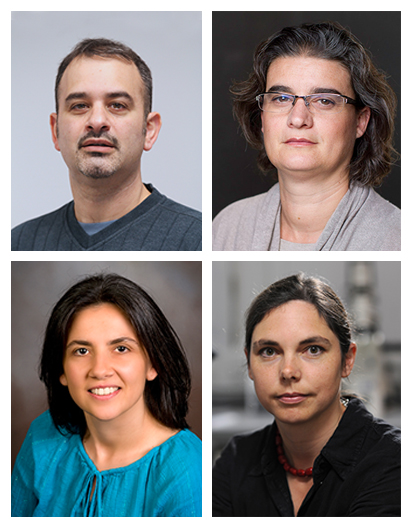Virginia Bioinformatics Institute embarks on new Fellows program to foster team science

The Virginia Bioinformatics Institute at Virginia Tech has embarked upon a new Fellows program that will expand collaborations with College of Science faculty members by immersing them into the institute’s computational and experimental laboratories.
The program is an important step in creating a synergistic relationship between the College of Science wet lab scientists and the institute's computational resources, extending the institute’s founding mission of applying powerful computational and modeling approaches to solve fundamental problems in the biological and biomedical sciences using team science.
“Our department is very enthusiastic about the program, which will add an important new dimension to our already strong ties with the the institute," said Brenda Winkel, professor and head of the Department Biological Sciences. "We look forward to locating four of our top research groups at the institute. All four of these groups already combine bench science with bioinformatics and computational biology and are ideally matched with the institute’s goals to build new partnerships in the area of systems biology.”
While the Fellows will remain attached to their home department of biological sciences, they will be physically immersed in the institute’s team-based infrastructure supporting large-scale biological and biomedical research, all with the ultimate aim of improving human health and habitat. The inaugural year is a pilot project.
"This initiative is part of an evolving effort to develop an integrated and lively life science community," said Dennis Dean, director of the Virginia Bioinformatics Institute. "Our faculty and staff are delighted to welcome our colleagues and we are excited about getting started. All of the institutes at Virginia Tech are designed to rapidly take advantage of emerging opportunities and VBI is committed to providing a resource for advancing research efforts campuswide."
Four faculty comprise the first cohort of Virginia Bioinformatics Institute Fellows.
Daniel Capelluto
Capelluto, an associate professor of molecular and cellular biology, studies signaling transduction systems involved in membrane trafficking and cell signaling. He is attempting to understand how platelet aggregation is regulated, which is a key challenge in blood circulation and coagulation.
He uses a variety of techniques, including high field nuclear magnetic resonance spectroscopy, circular dichroism, computer modeling, liposome-binding assays, fluorescence spectroscopy, and surface plasmon resonance spectroscopy.
Daniela Cimini
Cimini, an associate professor of molecular and cellular biology, studies Aneuploidy, a chromosomal defect linked to retardation and other genetic syndromes like Down’s syndrome. Aneuploidy has also been implicated in cancer development and progression.
Cimini uses a combination of microscopy, live-cell imaging, and protein inhibition to uncover the mechanisms of this genetic deviation. With this information, new treatments and therapies may be developed.
Carla Finkielstein
Finkielstein, an associate professor of molecular and cellular biology, focuses her research on elucidating the molecular basis that link disruption of circadian rhythms to cell division.
Her research impact many areas of science spanning from basic to clinical applications. For example, the emerging field of chronotherapy, in which treatments for cancer and other diseases are administered at times of the day most likely to yield the greatest efficacy, will rely on deciphering the regulatory systems to which all circadian components connect, and most importantly, will depend on an understanding of the links between the circadian and cell cycle mechanisms.
Today, the administration of cancer therapy based on circadian timing has shown encouraging results, but it still lacks a strong mechanistic foundation. Finkielstein’s research may provide novel mechanistic foundations for applying chronobiology to the treatment of breast cancer and will offer new targets for drug development and treatment.
Silke Hauf
An assistant professor of biological science, Hauf’s work focuses on understanding the dynamics and precision of mitotic control by molecular networks. She uses fission yeast as a model system, and specific areas of research focus for her have been sister chromatid cohesion, the mitotic checkpoint, and the role of aurora kinases in cell division.










